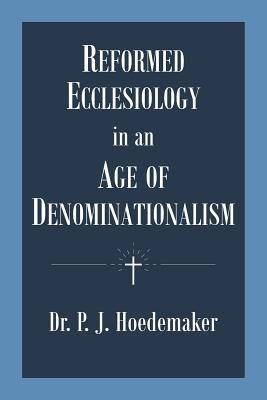Reformed Ecclesiology in an Age of Denominationalism

Reformed Ecclesiology in an Age of Denominationalism
Once upon a time, the state shared the public square with the church. The central location of the church building in every European town is mute testimony to this state of affairs. But those days are long gone. Nowadays there is an implicit or explicit consensus regarding the proper place of the church: out of sight and out of mind.
How has this sea change come about? Through a complete metanoia ("change of mind") regarding the public square. Church and state used to be in agreement about ultimate reality, but then came the wars of religion and the desire for a neutral state. This gave us the agnostic state, incapable of making any judgement regarding truth or falsehood regarding religion. Freedom of religion has been the result. But this freedom has come with a price - the loss of a grip on ultimate reality, on transcendent standards and values. It is every person for him- or herself, the triumph of congeries of opinion over truth.
Under these conditions, the church has itself experienced a transformation. It has been fragmented into myriad churches, none of which may claim ultimacy, all of which claim to proclaim the truth. We no longer have the body of Christ visibly expressed; instead we have denominations, private-legal constructs expressive of various consumer-oriented flavors of faith orientation.
Has unity then been abandoned? No; for it is not a question of unity or no unity, it is a question of what kind of unity. In the modern world, the churches have exchanged unity in terms of confession, with unity in terms of politics. Political parties are the vehicles through which Christians express a joint conviction. And this has brought the church down to the level of the interest group and the lobbyist, the inevitable result of an age of denominationalism.
Over 100 years ago, P. J. Hoedemaker already delineated and analyzed this state of affairs. The abysmal condition of the Dutch Reformed church formed the historical backdrop for his analysis, but the principles he developed during the course of his critique of the national church are applicable across the board in the modern world. Hoedemaker excavates the biblical and Reformational foundations of ecclesiology, the basics apart from which the church cannot escape from its current abasement.
PRP: 148.72 Lei
Acesta este Pretul Recomandat de Producator. Pretul de vanzare al produsului este afisat mai jos.
133.85Lei
133.85Lei
148.72 LeiLivrare in 2-4 saptamani
Descrierea produsului
Once upon a time, the state shared the public square with the church. The central location of the church building in every European town is mute testimony to this state of affairs. But those days are long gone. Nowadays there is an implicit or explicit consensus regarding the proper place of the church: out of sight and out of mind.
How has this sea change come about? Through a complete metanoia ("change of mind") regarding the public square. Church and state used to be in agreement about ultimate reality, but then came the wars of religion and the desire for a neutral state. This gave us the agnostic state, incapable of making any judgement regarding truth or falsehood regarding religion. Freedom of religion has been the result. But this freedom has come with a price - the loss of a grip on ultimate reality, on transcendent standards and values. It is every person for him- or herself, the triumph of congeries of opinion over truth.
Under these conditions, the church has itself experienced a transformation. It has been fragmented into myriad churches, none of which may claim ultimacy, all of which claim to proclaim the truth. We no longer have the body of Christ visibly expressed; instead we have denominations, private-legal constructs expressive of various consumer-oriented flavors of faith orientation.
Has unity then been abandoned? No; for it is not a question of unity or no unity, it is a question of what kind of unity. In the modern world, the churches have exchanged unity in terms of confession, with unity in terms of politics. Political parties are the vehicles through which Christians express a joint conviction. And this has brought the church down to the level of the interest group and the lobbyist, the inevitable result of an age of denominationalism.
Over 100 years ago, P. J. Hoedemaker already delineated and analyzed this state of affairs. The abysmal condition of the Dutch Reformed church formed the historical backdrop for his analysis, but the principles he developed during the course of his critique of the national church are applicable across the board in the modern world. Hoedemaker excavates the biblical and Reformational foundations of ecclesiology, the basics apart from which the church cannot escape from its current abasement.
Detaliile produsului









